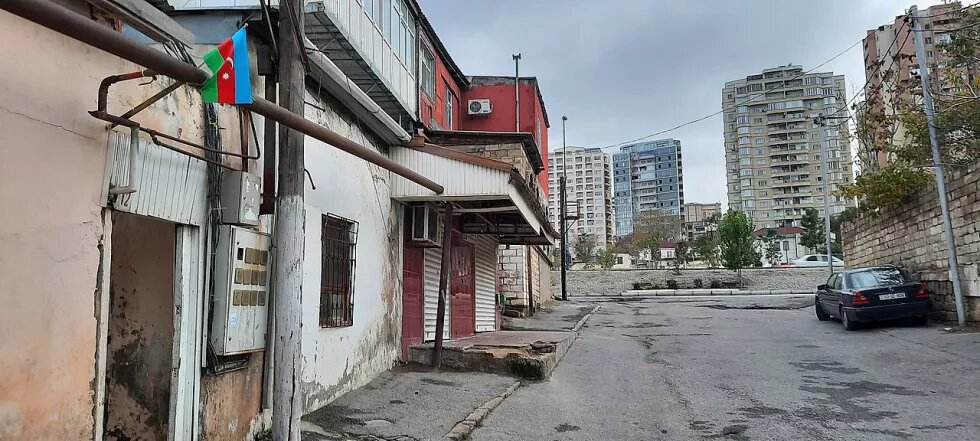
Russia's war in Ukraine is changing the balance of power in Eastern Europe. This has implications for the Armenian-Azerbaijani conflict and provides new options for mediation for the EU and the West.
This article was initially published on boell.de. The content of the publication is the sole responsibility of the author and can in no way be taken to reflect the views of the Heinrich Boell Stiftung Tbilisi Office – South Caucasus Region.

The Russian invasion of Ukraine has had significant implications for the South Caucasus. It has triggered processes that have changed the status quo on the ground and notably destabilized the region. In the Armenia-Azerbaijan context, Russia's decreasing capabilities in the South Caucasus, its changing priorities, and growing dependence on the Turkish-Azerbaijani tandem has created a new configuration that enables escalations and repeated use of coercive diplomacy by Azerbaijan.
Azerbaijan scored a decisive win in the Second Karabakh war of 2020 but could not achieve all of its political goals. Since the signing of the ceasefire statement in November 2020 Baku's primary goal has been the conversion of its military victory into tangible political outcomes. In the last two years, Azerbaijan's main political objective has been the signing of a peace treaty with Armenia that would further tip the post-2020 balance in its favor and would close the chapter of the Nagorno-Karabakh conflict without addressing the outstanding issues related to it.
Peace Treaty Negotiations
Baku presented its vision on the content of the peace treaty with Armenia back in March 2022. The foreign ministry of Azerbaijan published a package, consisting of 5 principles. The two key principles in this package were the mutual recognition of each other's territorial integrity and sovereignty as well as the absence of territorial claims against one another. Nagorno-Karabakh or the Nagorno-Karabakh conflict were not directly mentioned in this set of principles.
Armenia's initial reaction to Azerbaijan's package was positive. Yerevan announced that Baku's five principles were acceptable; however, they needed to be supplemented by Armenian proposals. In May 2022, Yerevan published its own 6-point package in response to Baku's proposals. Armenia insisted that the issue of Nagorno-Karabakh's security, final political status, and the rights of NK's population, should be addressed by the peace treaty. Prior to that, on April 13, Armenia's Prime Minister Nikol Pashinyan had given a ground-breaking speech in the parliament of the country indirectly announcing that Yerevan was willing to negotiate with Baku on a political status for Nagorno-Karabakh under Azerbaijani sovereignty.
However, the willingness of the Pashinyan government to mitigate their stance on the issue was not reciprocated by their counterparts in Baku. Azerbaijan has been refusing to discuss any political issue related to Nagorno-Karabakh and the Nagorno-Karabakh conflict with Armenia. Baku has been claiming that all the issues related to Nagorno-Karabakh are Azerbaijan's domestic affair and that there cannot be special security arrangements or a political status for the Armenians of Nagorno-Karabakh.
For many months, the negotiations on the peace treaty stalled because of Azerbaijan's reluctance to have substantive talks on the future of NK. There even has not been much progress in negotiations after Armenia agreed to separate the Nagorno-Karabakh settlement process from the peace treaty agenda during the quadrilateral meeting in Prague on October 6, 2022.
Territorial Interests
Baku's second important objective has been the opening of the so-called ''Zangezur corridor'' that is supposed to link the western regions of Azerbaijan with its exclave of Nakhchivan through a road and railway connection via the Syunik region of Armenia. The opening of this passage was stipulated in the ceasefire statement of November 9. However, the two sides have not been able to agree on the regulations and modalities on this passage.
Azerbaijan intends to get unimpeded access to Nakhchivan through Armenian territory with minimal Armenian presence on the ground. Yerevan is willing to grant the passage to Baku if it is under de jure and de facto Armenian control. Moreover, the Armenian side has been willing to open all the transport communications between the two conflicting countries that existed during the Soviet period. Baku has been interested only in the opening of the above-mentioned passage.
Azerbaijan has been trying to achieve its political goals with coercive diplomacy. Even before the outbreak of the war in Ukraine, Baku was exerting military pressure on Armenia to extort concessions on the negotiation table. In May 2021, Azerbaijan attacked Armenia and occupied swaths of its sovereign territory. Another big escalation occurred in November 2021 and resulted in the occupation of more territories within Armenia.
The effects of Russia’s War in Ukraine on peace in South Caucasus
The outbreak of the war in Ukraine completely untied Baku's hands. Since February 2022, Azerbaijan has initiated three major escalations in Nagorno-Karabakh and on the Armenia-Azerbaijan state border. In December 2022 state-sponsored, self-proclaimed Azerbaijani ''eco-activists'' blocked the Lachin corridor – the only road connecting Nagorno-Karabakh with Armenia and the outside world. At the time of writing, Nagorno-Karabakh has been under a total blockade by Azerbaijan for a month. The power vacuum in the South Caucasus brought about by the Russian invasion of Ukraine alongside Armenia's post-war weakness has been incentivizing Baku to flex its muscle in the pursuit of its maximalist agenda.
As already mentioned above, this new reality on the ground has been facilitated by the Kremlin's decreasing capabilities and changing interests in the region. Russia's preoccupation with the war in Ukraine has significantly limited its capabilities in other key regions of the post-Soviet space. In the South Caucasus, Moscow has been doing its best not to get involved in a direct confrontation with Turkey and Azerbaijan and wants to preserve its role as a neutral arbiter in the Armenian-Azerbaijani context. Azerbaijan in its turn has been periodically testing Russia's red lines, trying to change the status quo on the ground.
Another important factor limiting Moscow's options vis-a-vis Baku is its growing dependence on Turkey and Azerbaijan in the process of mitigating the effects of the Western-imposed sanctions. Ankara is a key trading partner for Moscow. Azerbaijan is also an important country for Russia and is part of the so-called North-South transport corridor that connects the Russian market with India through the territory of Azerbaijan and Iran. The importance of this corridor for Russia has significantly increased after the outbreak of the war in Ukraine as the Kremlin tries to diversify its trading relations with the outside world and establish new trade routes. Several days before the September attack against Armenia a declaration on the development of the North-South corridor was signed in Baku by Russia, Azerbaijan, and Iran. Russia is also interested in the opening of the so-called ''Zangezur Corridor'' as it wants a stable land link with Turkey that would be controlled by its border guard service.
Western diplomacy’s role in the peace talks
These changing realities on the ground, however, have created space for more active involvement of players who previously had a smaller influence in the region. The void left by Russia's decreasing capabilities in the South Caucasus has been partially filled both by the EU and the US. After the onset of hostilities in Ukraine, the EU has emerged as a leading mediator in the Armenian-Azerbaijani context. This process had actually started even before, but the war in Ukraine sidelined Russia and solidified the EU's role.
Several rounds of negotiations have taken place between the leaders of Armenia and Azerbaijan under the mediation of the president of the EU's European Council Charles Michel in recent months. After the September escalation of 2022, the EU sent a monitoring mission to the Armenia-Azerbaijan border for two months. This decision would have been unimaginable before the onset of the war in Ukraine. The mandate of that short-term mission ended on December 19. Presently, negotiations are underway to deploy a long-term EU monitoring mission to the Armenia-Azerbaijan border.
The US engagement in the Armenian-Azerbaijani context has also been growing in recent months. The US Secretary of State Anthony Blinken has been in direct contact with the leaders of Armenia and Azerbaijan. Washington has been an active supporter of the EU negotiation track. The US has also facilitated several meetings on the levels of foreign ministers and national security advisers of Armenia and Azerbaijan. Washington reportedly played a crucial diplomatic role in stopping the September 2022 escalation.
However, there are still serious doubts about the effectiveness of Western diplomatic efforts in the Armenian-Azerbaijani context. Despite the stabilizing role both the EU and the US have been playing in the region, it has not been enough to kickstart a genuine peace process between the parties. If the existing conundrum is to be overcome, Washington and Brussels should re-evaluate their approach to the conflict and take on more responsibility.
So far, European and American diplomats have been mainly engaged in bringing the leaders of Armenia and Azerbaijan together and giving them venues for negotiations. Moreover, an emphasis is always put on the need for direct talks. This is usually done to minimize Russia's negative impact on the peace process. However, under conditions of the serious power imbalance between Armenia and Azerbaijan, direct peace talks have turned into a process of coercion by Baku. Both the EU and the US should play a bigger role in the negotiation process and come up with their own proposals that could address all the outstanding issues.
There should also be an understanding in the West that the signing of a peace treaty between Armenia and Azerbaijan per se will not guarantee peace in the region if it does not find solutions for the main issues at hand. In that regard, there should be a clear vision on how to move forward with the agenda of security and the final political status of Nagorno-Karabakh. The propensity to accept Azerbaijan's maximalist view on the subject might result in the ethnic cleansing of more than 100,000 Karabakh Armenians, which would undermine the prospects for comprehensive peace in the region for decades to come.
And last but not least: there should be solid international guarantees that any signed document will be respected by the parties. There is a significant risk that even after signing a peace deal with Armenia, Baku will pursue with its coercive diplomacy trying to impose new concessions on Yerevan. There are already such precedents. The above-mentioned closure of the Lachin corridor and the total blockade of Nagorno-Karabakh by Azerbaijan is a blatant violation of the November 9 ceasefire statement. Without real international guarantees, even the signing of a peace treaty will not bring peace to the region.

